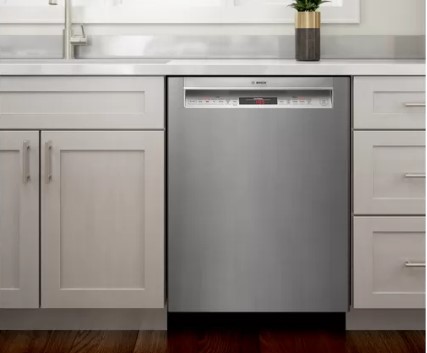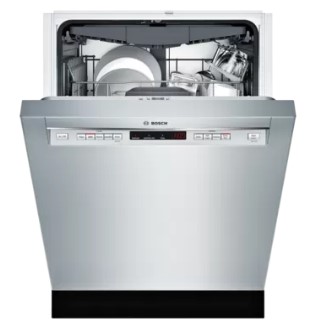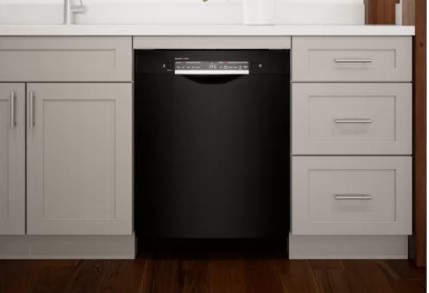Is your Bosch dishwasher not draining at end of cycle? Are the dishes coming out dirty or stained as a result, and you don’t know what to do or how to fix it?
Your Bosch dishwasher isn’t draining at the end of the cycle due to a clogged component, blocked drain hose, excess suds, faulty drain pump, or broken drain impeller.
One of those five issues is stopping your dishwasher from properly cleaning the dishes. And since this is such a serious issue, you must act quickly.
This Bosch dishwasher troubleshooting guide will walk you through all those five issues, explaining what exactly to check and what cause of action to take. Ultimately, you’ll fix the drainage and start having cleaner dishes at the cycle end.
Let’s jump into it!

In a hurry? Consider the five issues below to quickly troubleshoot your Bosch dishwasher when it doesn’t drain at the end of the cycle.
Quick Troubleshooting Guide for a Bosch Dishwasher Not Draining at End of Cycle
| Likely Cause | Fix | |
| 1. | Clogged Dishwasher Component | Clean a clogged drain filter, pump, air gap, garbage disposer, drain hose, or drain valve. |
| 2. | Blocked Drain Hose | Straighten out the drain hose to get rid of the pinches or kinks. |
| 3. | Excess Suds | Reduce detergent overuse and use the correct ‘recommendable’ detergent. |
| 4. | Faulty Pump | Replace the drain pump if it fails the continuity/ohm test. |
| 5. | Broken Drain Impeller | Replace the impeller if it’s broken. |
Why Your Bosch Dishwasher Won’t Drain at End of Cycle
Your Bosch dishwasher should drain all the way. If it doesn’t do it at the end of the cycle, it’s highly likely because of a fault, and it could be any of these five issues:
1. Clogged Dishwasher Component (drain filter, pump, air gap, garbage disposer, drain hose, or drain valve)
If your Bosch dishwasher won’t drain, it makes sense to inspect it for clogging. Overall, there are several components you must check to ensure they are clog-free, and if they aren’t, then you’ll need to clean them.
First, check the drain filter for clogging. It’s likely to clog with food debris, and if the clog is excessive, the dishwasher may fail to drain 100%. In fact, it’s advisable to routinely clean the dishwasher to avoid such an issue.
The other source of clogging is the pump. If it’s food-clogged, it won’t be able to pump out water, and the dishwasher will therefore fail to drain at the end of the cycle.
Also, check the garbage disposer (available in built-in Bosch dishwashers) and air gap (unavailable in all dishwashers) for clogging.
You can use your manual to see if the two components are available. If so, and they are clogged, then that is the reason your dishwasher won’t drain.
The drain hose and valve are the other two components to inspect for food debris clogging. If any of them is debris-clogged, the dishwasher won’t drain as it should.
Fix
If any of the dishwasher components is debris-clogged, clean it. To clean them properly, you’ll need to remove components like the filter, drain hose, and air gap.
Remember, you’ll need soap, a sponge, and preferably running tap water to clean the dishwasher components properly. And in some cases, you may need a soft brush, especially when cleaning the drain filter.
2. Blocked Drain Hose
While clogging is a massive concern when your Bosch dishwasher won’t drain, it’s not the only issue to check when inspecting the drain hose. You should also check it for pinching and kinking, which could stop the dishwasher from draining.
Fix
Straighten the drain hose to remove the pinches and kinks and promote smooth drainage.
3. Excess Suds
If there are many suds, they may interfere with the drainage. If so, you could be just overusing the detergent, and if that’s not it, you could be using the wrong detergent.
In the latter case, you could be using a detergent Bosch doesn’t recommend, which over-foams. For that reason, it’s essential to confirm the identity of the detergent the manufacturer recommends and possibly stick to it.

Fix
Ensure you use the dishwasher detergent that the manufacturer commends. While at it, use it in moderation. Avoid putting too much of it to avoid over-suds formation.
4. Faulty Drain Pump
Other than clogging, the drain pump may fail because it’s defective. It could be that the pump is damaged or perhaps worn out. In either case, it won’t pump out water from the dishwasher.
Initially, a failing pump struggles to pump out water, and the wastewater takes much longer to drain. You can, however, use a multimeter, as I’ll explain next, to determine if the drain pump is defective.
Fix
Use a multimeter to check the pump’s continuity or ohm reading. Ideally, a working drain pump should read 15-40 ohms. If that’s not the case, the drain pump is defective and thus needs a replacement.
5. Broken Drain Impeller
Lastly, if the reason why your Bosch dishwasher won’t drain isn’t one of the above four, it’s more likely a damaged drain impeller. The impeller’s job is to force water out of the drain hose. So, if it’s faulty, dirty water will likely remain at the bottom of your dishwasher.
Fix
Inspect the drain impeller for blockages and replace it if it’s broken.
Bosch Dishwasher Troubleshooting Not Draining
You can do several things to troubleshoot your Bosch dishwasher when it doesn’t drain. They include the following:
- Inspect the drain filter, drain hose, water valve, drain pump, air gap, and garbage disposal for food clogging and clean them if that’s the case
- Examine the drain hose for kinks and pinches and straighten it out to get rid of those blockage sources
- Reduce the amount of detergent and use the recommended detergent if there are excessive suds in the dishwasher
- Check the impeller for breakages and replace it if it looks damaged
- Check the drain hose for fault and replace it if it’s not working correctly or damaged
- It may also help to reset the dishwasher, preferably by plugging it out (hard reset)
Troubleshooting a Stuck Bosch Dishwasher
There are different things you can do if your Bosch dishwasher is stuck. First, it helps to reset the dishwasher.
So, how do you reset a Bosch dishwasher drain? Well, here’s how to do it:
Option 1 – Perform a Soft Reset
A soft reset involves pressing the start or reset button for about 3-5 seconds. Sometimes, you may need to open the dishwasher door before pressing start/reset and then closing the door for 1 minute.
After that, close the door before holding the on/off switch for 3 seconds.
Option 2 – Perform the Hard Reset
The hard/manual reset involves plugging out the dishwasher for about 5 minutes.
If the reset doesn’t unstick your Bosch dishwasher, consider changing the setting, as it could be all wrong. If that doesn’t work, inspect the door latch and replace it to see if it’s broken.

People Also Ask
1. Why Is My Bosch Dishwasher Standing Water After Cycle?
There is one most likely explanation for your Bosch dishwasher having standing water at the end of the cycle: clogging. It could be that one vital component is debris-clogged and therefore interfering with water drainage.
The said component could be the drain filter, hose, air gap, garbage disposer, or drain valve. If so, you should clean the affected part to eliminate the clogging.
However, if the issue is not clogging, it’s more likely a failed pump, which cannot pump out the water. If so, you’ll need to replace the drain pump. Don’t forget to check for a kinked or pinched drain hose, which you’ll need to straighten out.
2. What Causes a Bosch Dishwasher Not to Drain?
While there are different reasons why your Bosch dishwasher won’t drain, the most likely is clogging. Thus, inspect various dishwasher components for clogging, especially the drain filter, drain hose, garbage disposer, drain valve (where applicable), and drain pump.
But once you rule out clogging, check the drain hose for kinks or twists and straighten them out. Internally, you can check out the pump and the impeller for faults and replace them if they are not working correctly.
Another consideration, nonetheless, is the detergent. If the dishwasher is producing excess suds, you likely are using excess detergent. But if you aren’t, you are using the wrong detergent and should therefore use what the manufacturer recommends.
Don’t forget to check the impeller as it could be broken, and if so, replace it.
3. Why Is My Bosch Dishwasher Not Draining Completely?
Your Bosch dishwasher is not draining entirely because it’s clogged. In particular, check the drain hose, drain filter, air gap, garbage disposer, and drain pump for obstruction and clean them.
While at it, straighten out the drain hose if it’s kinked and replace the drain pump if it’s broken. Another component to check for breakage is the impeller; replace it if that’s the case.
And lastly, it could also be that you are using excess detergent, and if so, reduce its usage to avoid over-suds formation.
4. How Do I Force My Bosch Dishwasher to Drain?
You can force your Bosch dishwasher to drain by forcefully resetting it, and here’s how to do it:
- Open the dishwasher door
- Press the cancel + drain buttons for about 3 seconds
- Close the dishwasher door and wait for 1 minute
- Open the dishwasher door once again and press On/Off for 3 seconds
Alternatively, press the start/reset button instead of Cancel + Drain and follow the other steps.
Concluding Thoughts on a Bosch Dishwasher Not Draining at End of Cycle:
As shared above, there are at least five issues to check when your Bosch dishwasher won’t drain at the end of the cycle. First, start by checking for clogging and, in particular, inspect the drain hose, drain filter, air gap, garbage disposer, drain pump, and drain valve.
After ruling out a clogging, check the drain hose for kinks and remove them. Then inspect the dishwasher for excess suds and reduce detergent overuse. And if it’s a case of a broken impeller or faulty pump, replace them.
Also Read:
